Quote:The buck with the present imbroglio stops at the Palace, with Sultan Azlan Shah.
Unfortunately in our system at present, there is no effective system of checks and balances with respect to our monarchs, both at the state as well as federal levels.
They are also immune to prosecution in the conduct of their official duties. There is NO mechanism to fire or censure them.
In Perak, we have a Sultan who by any measure is the most qualified and experienced, having served as the nation’s top judge for many years. Yet his decision in this critical matter, which demanded the most judicious of judgment, proved to be unwise and precipitous. And that is putting it mildly.
Sultan Azlan Shah cannot pretend to be able to read or predict the thinking of his legislators after only a few moments of “chat” under the most severe royal protocol at the palace. That would be the height of royal arrogance. In any other circumstance, decisions made under such surroundings could be considered as coerced.
The Sultan ought to first also hear out the incumbent before making a decision. Common sense dictates that. One does not have to be a judge or have read the weighty tomes of legal luminaries to appreciate that elementary dictum. Hear both sides before rendering a decision! Even a new father knows that.
The voice of the people was loud and clear. Only that the Sultan refused to hear or chose to ignore it. No amount of subsequent royal pontifications will ever rectify or justify this error. Only a reversal of that earlier erroneous decision would.
It was too bad that Sultan Azlan Shah deputized his Raja Muda (Raja Nazrin) to the May 7th opening of the legislature. He missed a splendid opportunity to witness firsthand what his modern-day version of hulubalangs was up to!
It was pathetic to see the Raja Muda reduced to pleading for respect for his speech!
In today’s world, the people is sovereign. Just ask the descendants of the late Shah Pahlavi and King Farouk, or closer to home, the Sultan of Sulu.
-Dr. M. Bakri Musa
The Lesson from Perak
by
Dr. M. Bakri Musa
Excerpts:
The current political paralysis in Perak reflects the major failures of our KEY INSTITUTIONS.
It is a total breakdown at the palace, the legislature, and the permanent establishment. It also exposes the glaring inadequacies of the judicial system which has yet to adjudicate this critical and urgent matter of state.
It is not however, the failure of the people, as some pundits have implied by quoting the old adage that we deserve the government we get.
It is the voters’ prerogative whether to grant the incumbent party a stunning victory, humble it with an unstable slim majority, or even throw it into the ranks of the opposition. Canada and Italy have a long history of minority governments, and they have managed well.
A mark of a mature democracy, or any system for that matter, is the transfer of power from one entity to another smoothly and predictably.
Perak is a spectacular failure; it is also a preview for Malaysia.
Perak is one of three state governments that changed hands as a consequence of the 2008 general elections. In the other two, Kedah and Penang, the transition went much smoother. There were hiccups of course, like the destruction of state documents and the dissolution of legislators’ wives’ club in Selangor, for example. That reflected more infantile behaviors than institutional failure.
Why Perak should be the exception merits careful consideration.
We used to assume that if only we could get qualified and experienced people, then no matter how battered or inadequate our institutions, those people would rise up to the challenge.
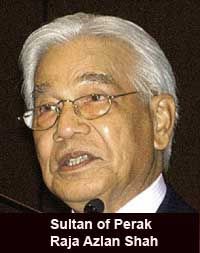 The Perak Royal Palace
The Perak Royal PalaceIn Perak, we have a sultan who by any measure is the most qualified and experienced, having served as the nation’s top judge for many years.
Yet his decision in this critical matter, which demanded the most judicious of judgment, proved to be unwise and precipitous. And that is putting it mildly.
This is not hindsight. Even at the time when he made that pivotal decision (which was the singular event that triggered developments which culminated in the spectacle of May 7), the voice of the people was loud and clear.
Only that the sultan refused to hear or chose to ignore it. No amount of subsequent royal pontifications will ever rectify or justify this error. Only a reversal of that earlier erroneous decision would.
It was too bad that Sultan Azlan Shah deputized his Raja Muda to the May 7th opening of the legislature.
While that may have spared the sultan the spectacle and embarrassment of being physically entrapped by the bedlam, he missed a splendid opportunity to witness firsthand what his modern-day version of hulubalangs was up to!
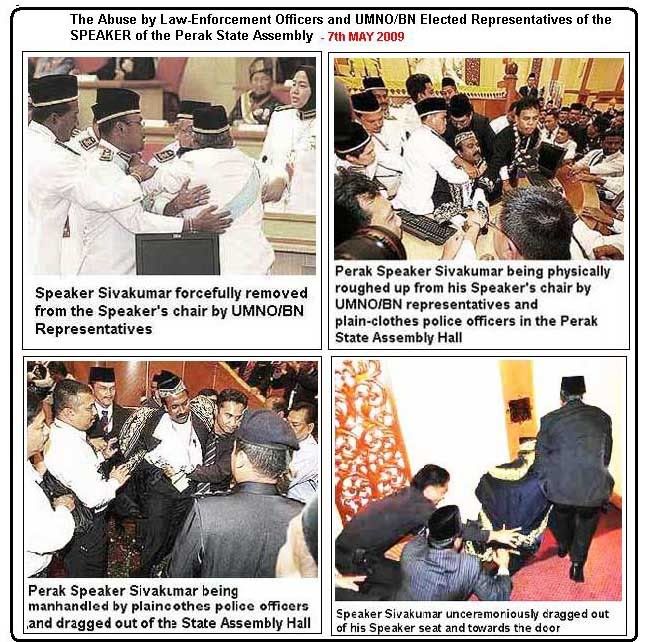
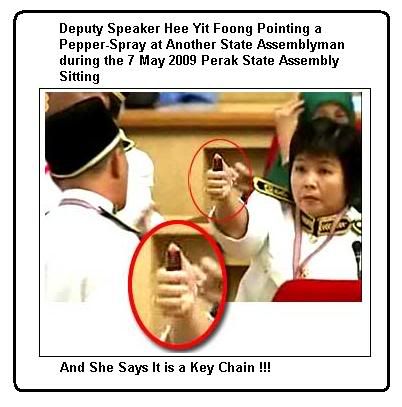
Instead it was his Raja Muda who was left to cool his heels for a good six hours! Well, let us hope that at least it was an edifying experience for him.
It was nonetheless pathetic to see the Raja Muda reduced to pleading for respect for his speech! Few, not even the normally pliant mainstream media, bothered to carry his speech in full. So much for the respect that he desperately sought!
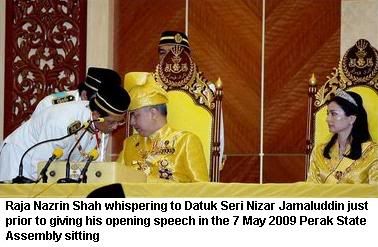
Amazingly in his speech, the Raja Muda did not deem it important or necessary to comment on the ugly spectacle he had just witnessed and been a part of. He remained aloof and strangely uncurious.
He must have been in temporary suspended animation, oblivious of his immediate surroundings, during his six-hour wait.
He was from another planet, earlier programmed to deliver his royal speech and then leave! Nothing more; for that you would have to reprogram him again!
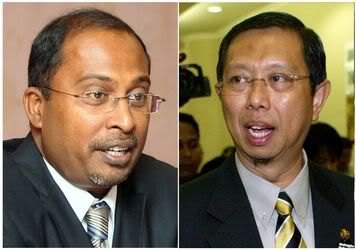 The Legislature
The LegislatureThe principal political protagonists here were Barisan Nasional’s Zamry Kadir, a Temple University PhD, and Pakatan’s Nizar Jamaluddin, a professional engineer fluent in multiple languages.
Then there was the Speaker of the House, Sivakumar, a lawyer by profession.
Their impressive diplomas and credentials meant nothing; they only looked impressive when framed and hanged on their office walls.
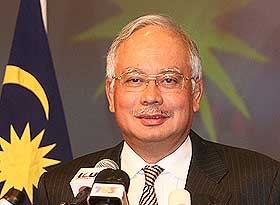 The Tax-Payer Funded Bureaucracy and the Police
The Tax-Payer Funded Bureaucracy and the PoliceInstead of being the stabilizing force and buffering factor, the permanent establishment, from the State Secretary to the State Legal Advisor and the Chief of Police, was hopelessly ensnared in the mess through their highly partisan performances.
They rapidly degenerated to being part of the problem (and a very significant one at that) instead of the solution.
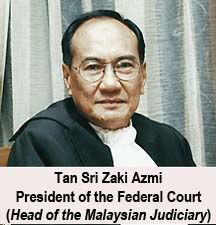 The Judiciary
The JudiciaryAs for the judiciary, it failed to appreciate the urgency and gravity of the crisis.
Thus the case did not merit an expedited hearing and left to meander through the usual slow judicial pathway.
By contrast, the 2000 American elections that saw the Florida ballot counts being litigated, the case ended up at the Supreme Court for a definitive decision in a matter of days, not months.
Lessons Learned
Thanks to modern technology, those who were not there in Ipoh could still follow the unfolding events in real time, trumping the severe censorship machinery of the government. Not that it was ever effective, just like the rest of the government.
Unfortunately there is NOT much that we could learn from the sorry spectacle. Even to declare that it reflected the sorry state of our institutions would be inadequate. Besides, we already have too many affirmations of that sad reality.
The next reflex reaction would be to declare, “Everyone is to be blamed!” While that is an understandable response, it does not solve anything, for the corollary to that statement would be that no one is to be blamed. That would be a cop out; we are all not equally culpable.
Everyone in the chain of events could have stopped if not reversed the destructive sequence right up to the day before the infamous debacle at the legislature. Failing that, the buck must and should stop somewhere.
In our system, the buck stops at the highest level, the PALACE.
Consider the chain of events again.
- First there were those renegade legislators switching party affiliations. No law against that; it was their choice. Perhaps that would galvanize the leaders of the party they had deserted to do a better job of screening and scrutinizing their future candidates. Maybe primary elections among party members (as in America) instead of a decision from headquarters would produce better and more reliable candidates. That certainly would be a useful lesson.

- However, this being Malaysia, things get more interesting. It turned out that those turncoats were earlier being investigated for corruption. Miraculously after their switchover, the charges were not pursued!
So far NO journalist has any thought of following that lead. - Even if those characters were pure, their switching over should never have triggered such a mess. Surely they could wait till the next sitting of the legislature to introduce whatever vote of no confidence they may have in mind of the leadership, and thus bring down the sitting government in the traditional and only legitimate way.
- Even if leaders of the Barisan coalition were to petition the sultan to dismiss the sitting Chief Minister (which they did), the sultan ought to first also hear out the incumbent before making a decision. Common sense dictates that. One does not have to be a judge or have read the weighty tomes of legal luminaries to appreciate that elementary dictum.
Hear both sides before rendering a decision! Even a new father knows that. - Sultan Azlan Shah cannot pretend to be able to read or predict the thinking of his legislators after only a few moments of “chat” under the most severe royal protocol at the palace. That would be the height of royal arrogance. In any other circumstance, decisions made under such surroundings could be considered as coerced.
Besides, it is their collective judgment expressed openly in a properly convened legislative forum that matters. Not only could you not predict individual behaviors, you could never foretell the group dynamics and the final collective decision.
If our political leaders make a mistake, they are held accountable. Just ask Abdullah Badawi.
Unfortunately in our system at present, there is no effective system of checks and balances with respect to our monarchs, both at the state as well as federal levels. They are also immune to prosecution in the conduct of their official duties. There is no mechanism to fire or censure them.
The Special Tribunal is only for prosecuting their personal misconduct. Well, at least that is a beginning, a measure of some accountability.
Regardless whether we have an effective system of checks and balances with respect to the sultans, our society has irreversibly changed. The old feudal order is now gone, for good, and never to return. Get used to it!
 In today’s world, the people is sovereign. Just ask the descendants of the late Shah Pahlavi and King Farouk, or closer to home, the Sultan of Sulu.
In today’s world, the people is sovereign. Just ask the descendants of the late Shah Pahlavi and King Farouk, or closer to home, the Sultan of Sulu.I tried to convey this in my poem, Makna Merdeka 50 (Meaning of Merdeka 50), I wrote to commemorate our 50th year of independence. I quote a couple of stanzas:
Rakyat negri bukan nya kuliTranslation
Untok di kerah ka sana sini
Zaman purba tak akan kembali
Mungkin menteri di buang negri!
Renungkan nasib si Idi Amin
Yang Shah Pahlavi pun tak terjamin
Pemimpin negri mesti meninggati
Rakyat – bukan Raja – yang di daulati!
(Blessed with freedom and reason are God’s children/To lords and kings we are not beholden/The feudal order has long been toppled/Let’s be clear, the sovereign is the people!
Ponder the fate of one Idi Amin/That of Shah Pahlavi was equally grim!/Those realities our leaders must heed/“Power to the people!” is the new creed.)
That in essence is the pertinent lesson from Perak.
-M.Bakri Musa
No comments:
Post a Comment